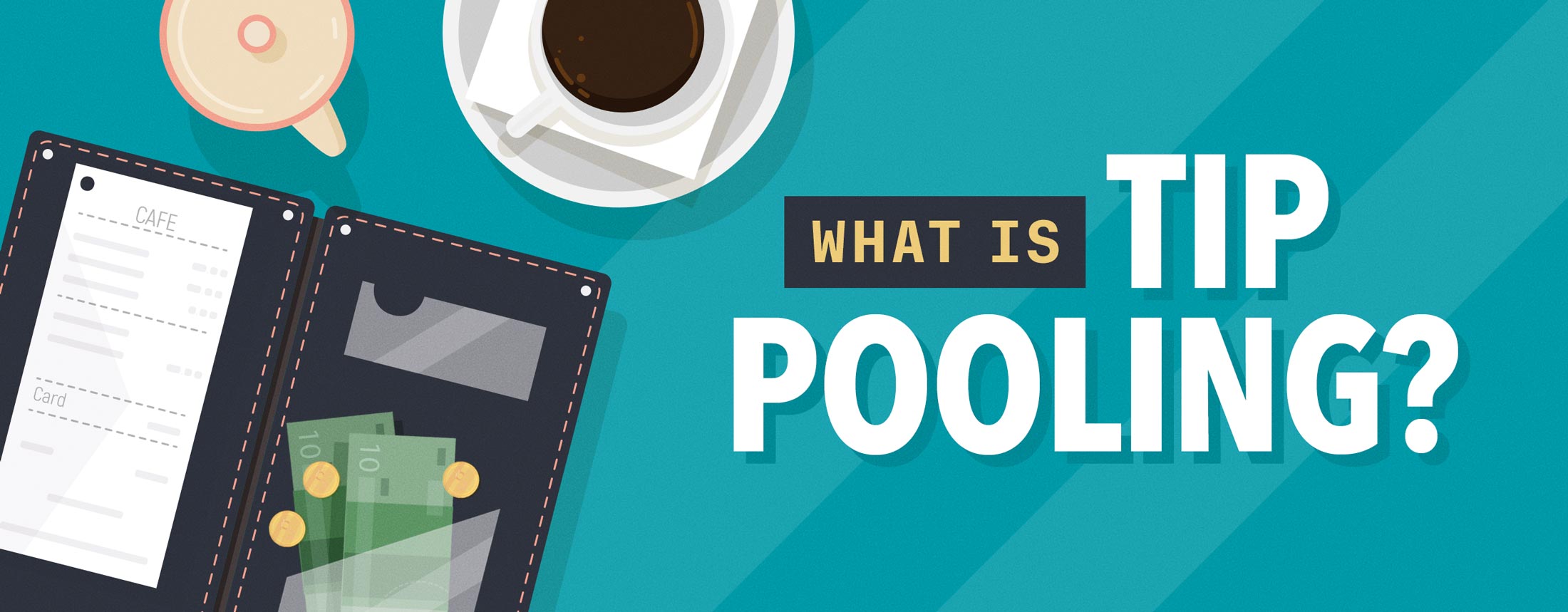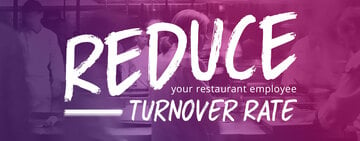
Tips play an essential role in compensating foodservice workers. Most customers plan to tip their server, but inevitably those tips will vary based on the party size, the cost of the bill, and the generosity of the patron. Some employers worry about tensions rising between their tipped staff and choose to forgo tipping altogether. However, employers can make sure each tipped staff member earns a fair share of tips through a process known as tip pooling. As a foodservice operator, you’re legally responsible for making sure tip pooling is done correctly and your workers are receiving their tips. To assist you, we explain what tip pooling is, who participates in it, and the legalities of restaurant tipping policies.
What Is Considered a Tip?
A tip, also known as a gratuity, is money beyond the cost of the bill given to an employee by a customer for the service provided. Cash, check, and credit card tips given to staff for services rendered are considered tips. Service charges are not considered tips.
What Is Tip Pooling?

A tip pool is a collection of all (or a portion of all) the tips received by directly tipped staff that is redistributed evenly amongst the tipped workers. Once the tipped staff put their tips into one large "pool", the tips are then divided among them. Back-of-house employees whose work assists tipped staff may participate in the tip pool if the servers also make the minimum wage and no tip credit is taken from them. Tip pooling ensures all employees are fairly compensated for their work. It's especially helpful when multiple services are being rendered and a single point of payment is used.
To understand how tip pooling works, consider this example: In a busy coffee shop, one employee oversees taking drink orders, several people oversee drink order preparation, one person oversees delivering the orders to the customers, and another person buses the tables after the customers leave. Tip pooling would ensure that all parties, from the order taker to the busser, receive their fair share of the tips earned.
Is Tip Pooling Legal?
Many states empower employers to legally require tip pooling. Check your state and local guidelines to confirm whether tip pooling is legal in your area. Regardless of your region, tip pooling is only legal if tipped employees still receive the mandated minimum wage while participating. If the employer takes a tip credit, then back-of-house staff must not participate in tip pooling. However, if the employer does not take a tip credit, back-of-house staff can legally participate in tip pooling.
Tip Pooling vs Tip Sharing
Unlike tip pooling, tip sharing (or "tipping-out") doesn't involve an equal distribution of tips between employees, but rather a set distribution rate, which is typically recommended by the employer. These rates are normally a percentage of tips, sales, or category receipts. The tip-out policy should be defined to distribute the pre-set percentage of funds to support staff, separately and apart from the pool participants.
Tip Pooling vs Tip Credit
Tip pooling and tip credits are two distinct things. A tip credit is a legal way for employers to count employees' tips towards their obligation to pay minimum wage. An employer may both take a tip credit and require tip pooling. In such cases, the tip pool will redistribute to each employee the amount applied to their tip credit.
Can Employers Take Tips from Employees?

If it's considered a tip, it belongs to the employee, not the employer. Employees cannot be required to give their tips or a portion of their tips to the company unless it’s to participate in a valid tip pooling policy. When tip pooling occurs, the employer cannot be part of the pool. Only employees may participate in tip pooling.
- Cash Tips - In all states, 100% of the cash tip is considered the employee’s property.
- Check Tips - In all states, 100% of the check tip is considered the employee’s property.
- Credit Card Tips - Some states mandate that the employer give the employee the full tip indicated by the customer, while other states allow the employer to subtract the credit card company’s processing fee from the tip before presenting it to the employee. However, the Department of Labor mandates that subtracting the transaction fee is only acceptable if it doesn’t reduce the employee’s pay below minimum wage. If it does, you must reimburse the employee on the next payday, and you must not wait until you receive the reimbursement from the credit card company.
- Service Charges - Services charges are mandatory fees that pay for the services provided. They are added by the restaurant regardless of party size. The employer is not obligated to give any of this money to the employee. Since it is part of a contract, not a voluntary tip, employees have no legal right to the money from service charges.
Restaurant Tip Policy for Employees

To make sure all their restaurant staff members are fairly compensated for their efforts, many foodservice operators develop a tip pooling program for employees. We explain which employees participate in tip pooling.
Employees Who Participate in the Tip Pool
Employees who customarily and regularly receive more than $30 per month in tips participate in the tip pool. It helps create a team environment since all tipped staff share in the tips received. Examples include:
- Bellhops
- Bussers
- Counter personnel
- Service bartenders
- Servers
Employees Who May Conditionally Participate in the Tip Pool
Employees who do not customarily and regularly receive tips but whose jobs support tipped workers may legally participate in tip pooling if the servers also make the minimum wage and no tip credit is taken for them. Examples include:
- Bakers
- Chefs
- Cooks
- Dishwashers
- Janitors
Who Cannot Receive Tips?
Supervisors or staff members with supervisory responsibilities cannot receive tips unless the tip is for services that they directly and solely provide. They must not participate in tip pooling. Examples of team members excluded from tip pooling include:
- Banquet managers
- Beverage managers
- Catering managers
- Dining room managers
- Food and beverage managers/directors
- Foodservice directors
- General managers
- Kitchen managers
- President/CEO
Restaurant Tip Laws

Under federal and state law, restaurant employees’ tips belong to them, not their employers. While this has always been the case, the Department of Labor updated its regulations in 2020 and 2021 to protect tipped workers. Their rulemaking explicitly prevents employers, supervisors, and managers from taking their employees’ tips by addressing 2018 legislative amendments to the Fair Labor Standards Act. It also updated regulations surrounding “dual jobs” and clarified the circumstances that permit an employer to take a partial credit against their minimum wage obligations. We outline these updates and their ensuing clarifications below.
On December 30th, 2020, The Department of Labor published a final rule “Tip Regulations Under the Fair Labor Standards Act (FLSA)”. On April 30, 2021, the following parts of this rule became effective:
- Employers, managers, and supervisors must not keep employees' tips under any circumstances. This includes tips received through tip pools.
- Non-tipped employees can participate in a tip pool if their employer pays the full minimum wage and takes no tip credit.
- In most cases, employers who collect tips for a mandatory tip pool must fully redistribute the tips within the pay period.
- Employers who collect their staff’s tips to operate a mandatory tip pool but don’t take a tip credit are required to maintain and preserve payroll or other records with information on tip-receiving staff members. They must also record the weekly or monthly number of tips reported by the employee.
On September 24, 2021, The Department of Labor issued the Civil Money Penalty (CMP) final rule, which withdrew and modified two sections of the 2020 Tip final rule. The CMP final rule became effective on November 23, 2021, and accomplished or clarified the following points:
- Restored - The Department of Labor’s ability to evaluate CMPs against employers violating the FLSA by taking their employees’ tips was restored. Violations need neither be repeated nor willful for them to be evaluated.
- Adoption - The same procedures, rules, and amount considerations as apply to other FLSA CMPs were adopted for tip keeping.
- Clarification - Managers and supervisors must not receive tips from tip pools but are not prohibited from contributing to mandatory tip pools.
- Clarification - Managers and supervisors may keep tips if customers give them for services they directly and solely provide.
Then, on October 29, 2021, The Department of Labor issued the Dual Jobs final rule which withdrew and modified the dual jobs section of the 2020 Tip final rule. Effective on December 20th, 2021, The Dual Jobs final rule accomplished the following points:
- Clarification - Employers must only take tip credits for time spent performing tipped work and must not take tip credits for time spent on untipped work.
- Defined - Tip-earning work and work that directly supports tipped workers were defined as tipped occupations.
- Clarification - Tip-producing work is any work performed by a tipped employee that they receive a tip from the customer for doing. For directly supporting work, the employee must be assisting in the preparation or execution of tip-producing work.
- Clarification - To count as tip-producing work, a non-tipped worker must perform tasks that directly support tipped employees for either over 20% of hours worked during the part of the workweek that they engaged in a tipped occupation or during a continuous period of 30 minutes.
Restaurant Tips FAQ

To help foodservice operators navigate tipping procedures, we answer the most frequently asked questions about restaurant tipping policies below.
Is a Service Charge a Tip?
A service charge is not a tip. It's a mandatory fee charged by a business for providing its products or services. Waiters and staff members do not receive any of the service charge money. While you may wish to forgo a tip after seeing a service charge, doing so will leave your waiter under-compensated.
What Is Tipping Out?
A tip out is a percentage of a server’s tips that they share with other employees whose jobs indirectly assist them. Tip outs can be voluntary or part of a mandated tip sharing agreement. Beneficiaries of tip outs include bussers, back waiters, and bartenders.
Paying Credit Card Tips to Employees
When tips are included in credit or debit card payments, employers must pay the tip to the employee. Check your state law to see if you’re permitted to reduce the tip to cover the transaction fee charged by the credit card company.
Can an Employer Claim Tips for You?
According to the Fair Labor Standards Act (FLSA), an employer can credit a portion of their employee's tips towards paying them minimum wage. The employer can claim set amounts against the minimum wage requirement but must not deduct tip credits from their staff’s pay.
How Tipping Works
When eating in a restaurant in the United States, diners should plan to tip their waiter between 15 and 20 percent of their pre-tax bill. If paying your tip with a credit card, calculate your tip based on your pretax bill and then write the amount on the tip line of your receipt. If you want to pay your tip with cash, leave your tip behind for your waiter after you’ve settled your bill.
Can a Manager Take Tips?
Under FLSA (Fair Labor Standards Act), managers are prohibited from keeping their employees’ tips. The only time managers can take tips is to put them in a tip pool, but they cannot participate in the tip pool. The only tips managers can receive are those given to them for services that they directly and solely provide.
What Percentage of Tips Are Servers Required to Claim?
Servers are required by law to report 100% of their tipped income. If a business's total reported tips on food and beverage sales is less than 8%, the business is required to allocate additional tipped income on the W2 of every tipped employee that reported less than 8% of respective sales.
Now that you understand tip pooling, you can take steps to execute it legally. Creating an equitable environment is not only essential for your legal standing, but it also fosters loyalty and support from your staff. With the rise of staffing shortages, securing employee loyalty has never been more important.





